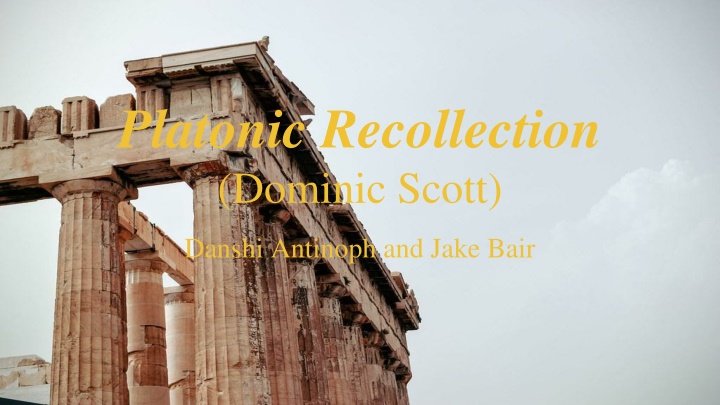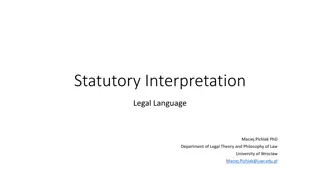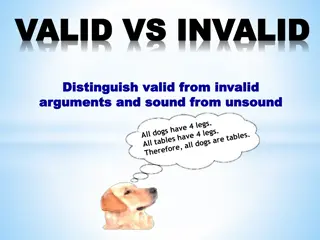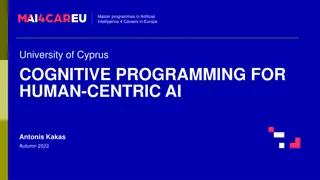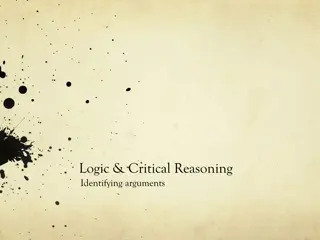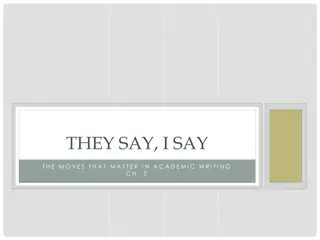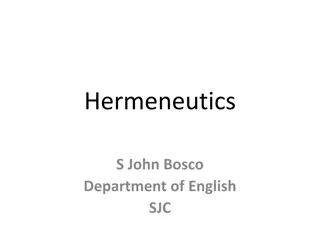Recollection and Interpretation: Scott's Arguments on Learning
Dominic Scott delves into the concept of learning as recollection in his analysis of Platonic dialogues, discussing the cooperation between innate and empirical knowledge, the role of perception, and the idea of recollection as the recovery of knowledge from a previous existence. The examination includes Kantian and Demaratus interpretations, addressing questions on amnesia, recollection, and the origins of thoughts and concepts.
Download Presentation

Please find below an Image/Link to download the presentation.
The content on the website is provided AS IS for your information and personal use only. It may not be sold, licensed, or shared on other websites without obtaining consent from the author.If you encounter any issues during the download, it is possible that the publisher has removed the file from their server.
You are allowed to download the files provided on this website for personal or commercial use, subject to the condition that they are used lawfully. All files are the property of their respective owners.
The content on the website is provided AS IS for your information and personal use only. It may not be sold, licensed, or shared on other websites without obtaining consent from the author.
E N D
Presentation Transcript
Platonic Recollection (Dominic Scott) Danshi Antinoph and Jake Bair
Scotts Main Argument / Texts Analyzed What we call learning is actually the recovery of knowledge from a previous existence (Scott 93). Kantian (K): cooperation between innate and empirical to explain ordinary thought Demaratus (D): Herodotus s story of Demaratus Senses inform us without help from innate knowledge of the forms Recollection not an account of ordinary thought D vs. K difference: What exactly is innate and what is supplied from external sources? Platonic Dialogues Covered: The Meno The Phaedo The Phaedrus
Questions to be Addressed: When does this amnesia go away? Does it ever go away? Does everyone recollect? Who exactly recollects? What is recollected? How we classify particulars according to some: Ex: something is beautiful or that two objects equal Where do we acquire these concepts of beauty and equality? Some concepts too difficult for sense perception to provide on its own, they must come from soul s internal resources (through recollection) Where do thoughts come from? The soul Perception Human understanding product of interaction between info that our senses give us about objects and concepts
Understanding the Kantian Interpretation Perception and innate knowledge of the forms Everyone has achieved a dim recollection of the forms even though they may not have brought their knowledge out into the full light of day (Scott 95). Cooperation between innate and empirical to explain ordinary thought Intuitions and concepts attempts to explain our intellectual activity from infancy through to maturity (continuous path of recollection) Everyone experiences process formation, thus Everyone recollects Optimistic interpretation
Understanding the Demaratus Interpretation (i) 1. Spartan during the Persian wars Turned against the Persians and became a Greek spy Sent a warning to the Greeks: Invasion warning inscribed on wax on a wooden tablet Message concealed beneath wax layer Message later discovered once wax is stripped away For Scott s example: Imagine D had not left the surface wax blank but had inscribed upon it something innocent for Persian consumption 2 messages: one obvious but unreliable and one true but hidden away from view What this ex reveals: message was inscribed, readers had no idea there was a message, deceived by the message Deceived by message written Interpretations of this example: Blank tablets at birth i. Rely upon external sources, perceptions, etc to form notions ii. Form opinions and make sense of formed views without innate knowledge and resources iii. Souls have knowledge of entities that exist in separation from particulars (no consciousness of these entities) 2. 3.
Understanding the Demaratus Interpretation (ii) Innateness to explain knowledge of transcendent entities (the forms), with which particulars are unfavorably compared Recollection is not an account of ordinary thought Recollection to cover a period of later higher learning Engaging in conceptual thought does not = recollection Thus, not all learning is recollection Recollection begins w/ philosophizing, limited b/c it s a skill for the elite/intelligent Difference in # of people who recollect Recollection difficult from start Pessimistic interpretation
The Meno Main Argument: Determine whether virtue is taught or if it is a teachable practice at all Socrates theorizes that discovery is made possible by our ability to revive certain memories within us. Ie. Slave boy examination
The Meno: Scotts Analysis Passage examined: 80a1-86d1 Learning and research are wholly recollection (81d4-5) Suggests recollection must cover wider learning span than K advocates 3 steps in recollection process: 1. Slave boy realizes that he previously believed to be right is wrong Perplexed, leads to first instance of recollection 2. Mere awareness of ignorance towards the acquisition of true opinions. No knowledge yet 3. Knowledge acquired. Opinion with explanatory reasoning , converts to knowledge and it is recollection Conclusions: Recollection starts after contact with a stimulus. K would agree
The Meno: Scotts Analysis [OBJECTIONS] Learning and research are wholly recollection Socrates says: See whether it seems to you that he is learning from me or simply being reminded (82b6-7) Slave boy to recollect from the moment he speaks, Not enough evidence to support K Recollection to explain how we come by concepts we use in every day thought If Meno sees slave boy recollecting false judgments, Socrates argument proven false Must examine how the slave boy got the right and wrong answers
The Phaedo Main Argument: Prove the immortality of the soul / demonstrate that the soul must have existed before birth. Equality Knowledge of the form, compare sensible equal objects with it Must already have knowledge of the form to make comparison Must have knowledge of form before using sense (before birth), therefore soul must have existed before birth
The Phaedo: Scotts Analysis (i) Passage Examined: 72e3-77a5 Scott s Discussion of the Phaedo: 1. What is recollection intended to explain? 2. Who actually recollects? Scott derives this question from Socrates first-person plural dialogue, which causes confusion as to whom he refers to: philosophers, friends, or people. Us
The Phaedo: General Conditions for Recollection Socrates claims: cognitive achievements 1. We have come to think of the form of equality from perceiving the particulars (74a9-d3) 2. We compare the particulars to the form (74d4-75a4) Intro to main argument General Conditions for Recollection (74a8) 4 conditions for recollection (if we are reminded of x by y) (1) we must have known x beforehand (73c1-3), (2) we must not only recognize y but also think of x (73c6-8), Think of x and y, x has to be the object of a different knowledge than y (3) x must not be the object of the same knowledge as y but of another (73c8-9), 3rd condition problem: if we insist that Plato uses recollection to explain concept formation Recollection of forms from sensible particulars will be impossible. (4) when x resembles y, we must consider whether y is lacking at all in relation to x (74a5-7).
The Phaedo: Scotts Analysis (ii) We know what the equal is (74a9-d3): Remarkably not just ordinary thought (Example): Two sticks and two stones are not just equal If we recognize concept formation, we cannot recognize the equal stick We recognize something is equal only by recollection, proving that the form is already there Sticks can t cause us to recollect the form We have noticed the deficiency of the particulars to the form (74d4-75a4) Cannot perceive a form, can perceive two sticks and their equality Not the form of beauty or the form of equality We could not have compared the forms with the particulars unless we had known the form before we first used our senses, i.e. before birth (74e9-75c6) Knowledge of forms before birth We forget our knowledge of the forms at birth and regain it by recollection (75d7-76d6) Elite
The Phaedo: Scotts Analysis (ii) Pessimistic approach aligns with D Recollection is not used to explain concept formation Senses - deceptive Confirms D s approach that recollection is limited and the rest do not manifest their latent knowledge Deception versus missing out Important takeaway to D s view and Phaedo: Similar in that the Greeks scrape away the wax What is required for any successful inquiry is that we turn away from the perspective gained from sense-perception
The Phaedrus In the Phaedrus Plato describes how the vision of the form is lost. He says the soul is like winged chariot with wings accompanied by Gods. The souls who are able to achieve a glimpse of the vision of the forms are able to continue flying, but those who do not lose their wings and are reincarnated. Recollection through Madness When someone falls in love with a particular and recollect the divine form they experience pain. This causes the soul of the wings to regrow.
The Phaedrus: Scotts Analysis Scott concludes that all human beings are capable of reasoning which makes us human. Therefore involves the recollection of the forms and more importantly a soul that has not seen the forms cannot enter a human body. It is our obligation as humans to recollect the forms we once knew.
Conclusions Scott s arguments sway heavily in favor of the Demaratus interpretation. Scott believes that people never begin to recover from their amnesia. Meno fails to provide a substantial Kantian argument. The Phaedrus and the Phaedo counter K s argument.
